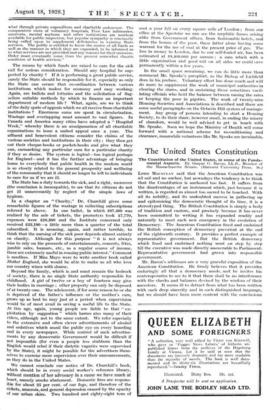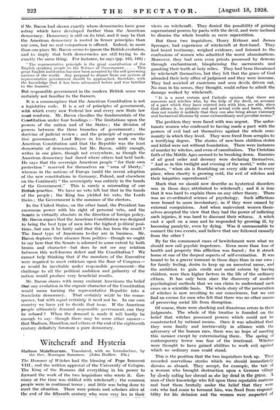The United States Constitution
The Constitution of the United States, in some of its Funda- mental Aspects. By Gaspar G. Bacon, LL.B., Member of the Massachusetts Senate. (Harvard University Press. Os.) LORD MACAULAY said that the American Constitution was all sail and no anchor, but nowadays the tendency is to think that the Constitution is anchored too fast. It suffers from the disadvantages of an instrument which, just because it is written, is regarded as almost too sacred to be touched. With all its nobility, and its undoubted success in gathering up and epitomizing the democratic thought of its time, it is a stereotyped thing. The British Constitution is simply a body of tradition and custom, and precisely because it has never been committed to writing it has expanded readily and naturally to meet each new emergency in the evolution of Democracy. The American Constitution fixed and enshrined the British conception of democracy prevalent at the end of the eighteenth century. It provides a perfect example of representative government. But the British democracy which fixed and enshrined nothing went on step by step till the executive was made directly answerable to Parliament. Representative government had grown into responsible government.
Mr. Bacon's addresses are a very graceful exposition of the American Constitution. He firmly believes that it provides enduringly all that a democracy needs, and he invites his contemporaries to see to it that there shall be no interference with the checks and balances devised by the wisdom of their ancestors. It seems ill to detract from what has been written with such deep sincerity and in such distinguished language, but we should have been more content with the conclusions if Mr. Bacon had shown exactly where democracies have gone astray which have developed further than the American democracy. Democracy is still on its trial, and it may be that the American democracy is rooted in firmer principles than our own, but no real comparison is offered. Indeed, in more than one place Mr. Bacon seems to ignore the British evolution, and to imply that both democracies are still trying to do exactly the same thing. For instance, he says (pp. 165, 166) :
"The representative principle is the great contribution of the English speaking people to the Science of Government. . . . This great English institution has now been accepted by the self-governing nations of the world. Any proposal to depart from our system of representative government should be approached, therefore, with the knowledge that it has been advocated before and was familiar to the framers."
But responsible government in the modern British sense was certainly not familiar to the framers.
It is a commonplace that the American Constitution is not a legislative code. It is a set of principles of government, with which every new Federal law and every new State law must conform. Mr. Bacon classifies the fundamentals of the Constitution under four headings :—The limitations upon the powers of the nation and of the States ; the division of powers between the three branches of government ; the doctrine of judicial review ; and the principle of representa- tive government. Lord Bryce in his great work on the American Constitution said that the Republic was the least democratic of democracies, but Mr. Bacon, oddly enough, writes in one place, though not everywhere, as though the American democracy had dared where others had held back. He says that the sovereign American people "for their own protection" reserved for themselves an "area of liberty," whereas in the nations of Europe (until the recent adoption of the new constitutions in Germany, Poland, and elsewhere on the Continent) "the sovereignty was entirely in the hands of the Government." This is surely a misreading of our British practice. We have no veto left but that in the hands of the people ; the King has yielded his veto, the Lords theirs ; the Government is the nominee of the electors.
In the United States, on the other hand, the President has enormous power with his right of personal veto, and the Senate is virtually absolute in the direction of foreign policy. Mr: Bacon argues that the American Constitution was designed to bring the best type of men into the highest political posi- tkms, but can it be fairly said that this has been the result ? The finest type of Americans to-day are in business. Mr.
Bacon deplores their absence from politics—though we ought to say here that the Senate is adorned to some extent by both brains and character—but does he not see any relation between this well-known defect and the Constitution ? We cannot help thinking that if the members of the Executive were required to meet criticism upon the floor of Congress— as would be inevitable under responsible government—the challenge to all the political ambition and gallantry of the nation would produce very beneficial results.
Mr. Bacon shares with many eminent Americans the belief that any evolution in the organic character of the Constitution would mean turning the representative Republic into n Socialistic democracy. That certainly ?skit/ be the conse-
quence, but with equal certainty it need not be. In our own country we have yet to decide that issue. If the American people ultimately demand responsible government, can they
be refused ? When the demand is made it will hardly be enough to say—though there may be some other answer—
that Madison, Hamilton, and others at the end of the eighteenth century definitely forswore a pure democracy.

































 Previous page
Previous page